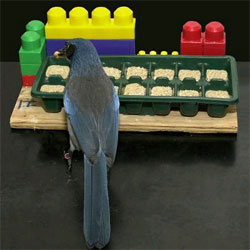Birds plan for the future
Birds plan for the future
mongabay.com
February 21, 2007
New research suggests that some birds plan for the future. Previously it was believed that planning was exclusively a human activity.
Writing in the current edition of the journal Nature, scientists at Cambridge University found that western scrub-jays plan for future food shortages by storing food. Unlike squirrels and other animals that store foods during lean times as a matter of habit, the researchers show that the birds actually learn from their previous experiences of food scarcity, saving food for future consumption when they anticipate future periods of famine.

University of Cambridge. |
“The jays spontaneously plan for tomorrow, without being motivated by their current needs,” said Nicola Clayton, Professor of Comparative Cognition at the University of Cambridge. “People have assumed that animals only have a concept of the present, but these findings show that jays also have some understanding of future events and can plan for future eventualities. The western scrub-jays demonstrate behaviour that shows they are concerned both about guarding against food shortages and maximising the variety of their diets. It suggests they have advanced and complex thought processes as they have a sophisticated concept of past, present and future and factor this into their planning.”
Clayton, along with co-author and colleague Tom Dickinson, believe this is the first known example of future planning in animals.
Their conclusions are based on a series experiments, two of which are described in a new release from Cambridge.
-
On alternate mornings eight jays were given breakfast in one compartment or refused breakfast in another, before being allowed free access to food the rest of the day. On the sixth day of the experiment they were suddenly given whole pine nuts suitable for caching in the evening. The researchers observed that the jays consistently cached most pine nuts in the tray in the “no breakfast” compartment, anticipating that they would not be fed in the following morning in that compartment.
Another experiment showed that the birds were able to plan ahead to provide themselves with a more varied diet. The jays were consistently given a breakfast of peanuts in one compartment and dog kibble in the other. When the birds in the evening were offered both foods, they preferred to cache peanuts in the kibble compartment and vice versa — to make sure they had an interesting breakfast the following morning.
The paper is titled “Planning for the future by western scrub-jays.” It is published in the February 22 issue of Nature.







